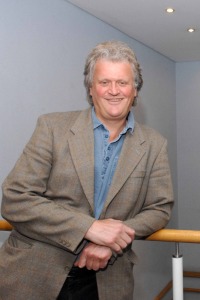Tim Martin walks into a pub in Blackrock….
Tim Martin arrives into The Three Tun Tavern (formerly Tonic) in Blackrock, slightly out-of-breath, perspiring and 35 minutes late for our rendezvous. The founder and Chief Executive of the JD Wetherspoon chain of nearly 1,000 pubs in the UK had walked all the way from Ballsbridge after asking someone there how far it was to Blackrock and getting the stock Irish answer “About 15 minutes give or take….”.
I’ve always wondered why the JD Wetherspoon pub chain seems to stand head-and-shoulders above all the other chains in the UK in terms of its success.
So it’s perhaps indicative that its founder requests me to move seating – I’ve selected a nice secluded corner, well out of the way of the hustle & bustle of Wetherspoon’s first RoI pub for our chat – to where he can better observe the workings of the staff while we talk. Attention to detail, see?
“I played rugby at uni” he opens, “so the last time but one I was in Blackrock I was playing against Blackrock College in ‘72 or ’73.”
Doesn’t mention the score and bet he wasn’t late that time….
The ‘aggregation of marginal advantage’
Why the ‘head-and-shoulders’ success of the chain, I ponder out loud.
I expect a pat response but Tim believes this to be a complex question for any business.
“I think it’s focusing on trying to get the thousand components of a business right and trying to improve lots of little things rather than having some grand strategy; if you look at our pubs, I don’t think anything is perfect because it never will be, but our beer is better than average, our pubs are cleaner than average, our steaks are better than average etc – I think it was the manager of the Sky Cycling team in the Tour de France who called it ‘the aggregation of marginal advantage’. The team won the Tour two years in a row, you know.”
Can he narrow Wetherspoon’s success down to three specific components perhaps?
He takes a long pause, punctuated by a quaff from his well-earned half-pint of bitter, “What’s most important here is the concentration on people,” he begins, “Linked to that is the bonus system where we pay a third of our profits out to the staff working in our pubs based on a range of factors, partly on profits, partly on standards etc and then there’s training”.
He ponders this response in its entirety before slowly nodding his head and adding, “So it would be people, bonus systems and training – all linked”.
Some believe Wetherspoon makes much use of ergonimic design in the bar’s working area to maximise output (while minimising staff).
He remains relatively vague about this but does offer, “It works through trial and error and is no different to designing a car seat or an engine. The perception of what is best changes and is modified as you go along.
“Everyone, even if they’ve only got one pub, tries to do this.
“It’s a good theory which we try to follow but it never works out in practice.
“A lot of our equipment gets out-of-date. The new till doesn’t fit or you need to run another beer line and you realise you haven’t got a spare one so you end up packing the bar out; it’s an art, not a science.”
Food for thought
Wetherspoon’s food operation has evolved down through the years. It was the first pub company in England to offer food from opening to closing and it simply developed from there.
But it’s taken seriously.
“We sell more steaks than any other company in the UK and spend €200,000 on kitchen equipment alone in a new pub,” he tells me.
The well-worn acquisition trail
High volume plays a significant part in the company’s operation yet the group doesn’t seem to limit itself to city centre locations or to highly residential areas.
In some cases the company has little choice.
“We normally try to get into the centre of a typical town” he explains, “but I suppose London and Dublin aren’t typical. They’re ‘megacities’ so it’s difficult and expensive to get sites in a primary spot. We’d been trading in London for 13 years before we opened our first site in central London.
“So we open in places like Blackrock or Ballsbridge or those sorts of suburban locations.

“London and Dublin aren’t typical. They’re ‘megacities’ so it’s difficult and expensive to get sites in a primary spot.” – Tim Martin.
“You need a certain population but it can be made up of people coming into an area to shop, or tourists – or airports.”
At this relatively early stage, one wonders how Tim can quote a precise figure of €100 million for intended investment in Wetherspoon’s Irish pub network in the near future as has been reported.
He grins and holds his hands up.
“You’re right,” he responds, “It’s a figure that’s completely speculative based on several ‘ifs’ and other conditions. We could invest that much if it went very well and our pubs proved very popular.”
With around 40 to be employed in each outlet, the media also reported him as predicting that Wetherspoon’s would end up with around 30 pubs here. This too seems fanciful but to Tim it all adds up.
“We’ve got nine in Northern Ireland, so a figure of 30 here on the back of fag packet doesn’t seem too absurd. It’s a reasonable guesstimate,” he believes, “But I’d be the first to admit that if we don’t get it right, we’ll be on the next ferry back to Holyhead!”.
Supplier pricing
Wetherspoon was in the news recently when its first pub refused to stock Guinness due to a pricing disagreement with Diageo.
In fact Diageo products in beer or spirituous form remain conspicuously absent from the backbar here.
“It’s not only Diageo” he’s quick to point out, “but all wholesale prices in Ireland seem high to me. There’s very little in the way of discounts in Ireland so far as I can see.”
And he admits to a few companies over the years who haven’t wanted to trade with him – “a minority” he stresses. His instinct is not to get upset about it.
“It’s their business – for example, we sell quite a lot of beer from SAB Miller but they won’t sell us draught Peroni in England.”
Diageo, on the other hand, has been somewhat more pragmatic, seeing the sheer scale of Wetherspoon’s operation, but it has denied that Wetherspoon is its biggest customer. However Tim Martin, in turn, insists that it is.
“I should be angry, really” he smiles, “but if you walk from Grand Canal Square to Blackrock you’re too tired to be angry.”
TP Wetherspoon’s second pub opens in Dun Laoghaire soon. I consider informing him that it’s only about a 15-minute walk from here give or take….







